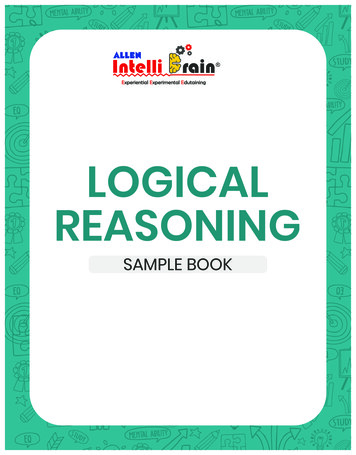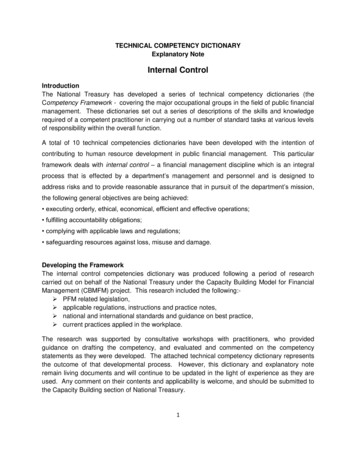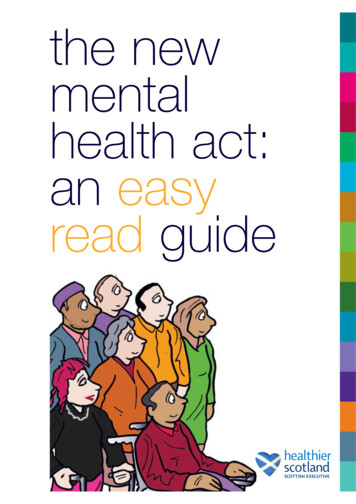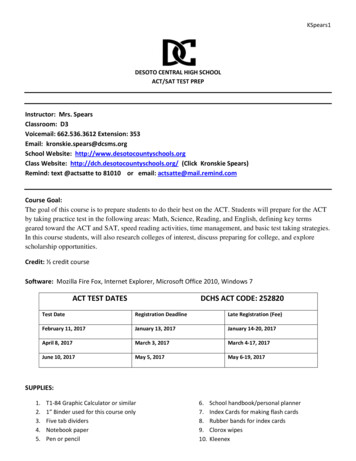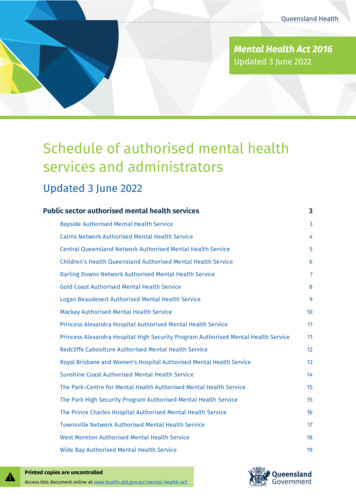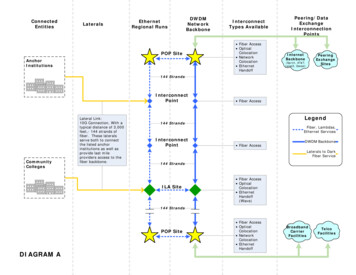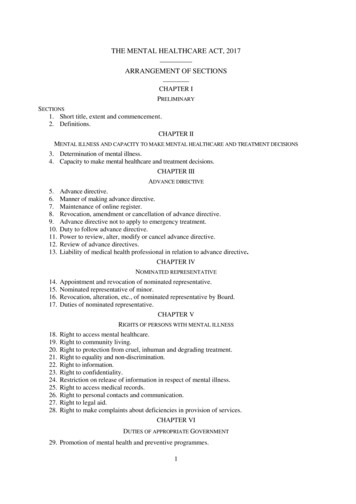
Transcription
THE MENTAL HEALTHCARE ACT, 2017ARRANGEMENT OF SECTIONSCHAPTER IPRELIMINARYSECTIONS1. Short title, extent and commencement.2. Definitions.CHAPTER IIMENTAL ILLNESS AND CAPACITY TO MAKE MENTAL HEALTHCARE AND TREATMENT DECISIONS3. Determination of mental illness.4. Capacity to make mental healthcare and treatment decisions.CHAPTER IIIADVANCE DIRECTIVE5.6.7.8.9.10.11.12.13.Advance directive.Manner of making advance directive.Maintenance of online register.Revocation, amendment or cancellation of advance directive.Advance directive not to apply to emergency treatment.Duty to follow advance directive.Power to review, alter, modify or cancel advance directive.Review of advance directives.Liability of medical health professional in relation to advance directive.CHAPTER IVNOMINATED 26.27.28.Appointment and revocation of nominated representative.Nominated representative of minor.Revocation, alteration, etc., of nominated representative by Board.Duties of nominated representative.CHAPTER VRIGHTS OF PERSONS WITH MENTAL ILLNESSRight to access mental healthcare.Right to community living.Right to protection from cruel, inhuman and degrading treatment.Right to equality and non-discrimination.Right to information.Right to confidentiality.Restriction on release of information in respect of mental illness.Right to access medical records.Right to personal contacts and communication.Right to legal aid.Right to make complaints about deficiencies in provision of services.CHAPTER VIDUTIES OF APPROPRIATE GOVERNMENT29. Promotion of mental health and preventive programmes.1
SECTIONS30. Creating awareness about mental health and illness and reducing stigma associated with mentalillness.31. Appropriate Government to take measures as regard to human resource development andtraining, etc.32. Co-ordination within appropriate Government.CHAPTER VIICENTRAL MENTAL HEALTH AUTHORITY33. Establishment of Central Authority.34. Composition of Central Authority.35. Term of office, salaries and allowances of chairperson and members.36. Resignation.37. Filling of vacancies.38. Vacancies, etc., not to invalidate proceedings of Central Authority.39. Member not to participate in meetings in certain cases.40. Officers and other employees of Central Authority.41. Functions of chief executive officer of Central Authority.42. Transfer of assets, liabilities of Central Authority.43. Functions of Central Authority.44. Meetings of Central Authority.CHAPTER VIIISTATE MENTAL HEALTH AUTHORITY45. Establishment of State Authority.46. Composition of State Authority.47. Term of office, salaries and allowances of chairperson and other members.48. Resignation.49. Filling of vacancies.50. Vacancies, etc., not to invalidate proceedings of State Authority.51. Member not to participate in meetings in certain cases.52. Officers and other employees of State Authority.53. Functions of chief executive officer of State Authority.54. Transfer of assets, liabilities of State Authority.55. Functions of State Authority.56. Meetings of State Authority.CHAPTER IXFINANCE, ACCOUNTS AND AUDIT57. Grants by Central Government to Central Authority.58. Central Mental Health Authority Fund.59. Accounts and audit of Central Authority.60. Annual report of Central Authority.61. Grants by State Government.62. State Mental Health Authority Fund.63. Accounts and audit of State Authority.64. Annual report of State Authority.CHAPTER XMENTAL HEALTH ESTABLISHMENTS65. Registration of mental health establishment.66. Procedure for registration, inspection and inquiry of mental health establishments.67. Audit of mental health establishment.68. Inspection and inquiry.2
SECTIONS69. Appeal to High Court against order of Authority.70. Certificates, fees and register of mental health establishments.71. Maintenance of register of mental health establishment in digital format.72. Duty of mental health establishment to display information.CHAPTER XIMENTAL HEALTH REVIEW BOARDS73. Constitution of Mental Health Review Boards.74. Composition of Board.75. Terms and conditions of service of chairperson and members of Board.76. Decisions of Authority and Board.77. Applications to Board.78. Proceedings before Board to be judicial proceedings.79. Meetings.80. Proceedings before Board.81. Central Authority to appoint Expert Committee to prepare guidance document.82. Powers and functions of Board.83. Appeal to High Court against order of Authority or Board.84. Grants by Central Government.CHAPTER XIIADMISSION, TREATMENT AND DISCHARGE85. Admission of person with mental illness as independent patient in mental health establishment.86. Independent admission and treatment.87. Admission of minor.88. Discharge of independent patients.89. Admission and treatment of persons with mental illness, with high support needs, in mentalhealth establishment, up to thirty days (supported admission).90. Admission and treatment of persons with mental illness, with high support needs, in mentalhealth establishment, beyond thirty days (supported admission beyond thirty days).91. Leave of absence.92. Absence without leave or discharge.93. Transfer of persons with mental illness from one mental health establishment to another mentalhealth establishment.94. Emergency treatment.95. Prohibited procedures.96. Restriction on psychosurgery for persons with mental illness.97. Restraints and seclusion.98. Discharge planning.99. Research.CHAPTER XIIIRESPONSIBILITIES OF OTHER AGENCIES100. Duties of police officers in respect of persons with mental illness.101. Report to Magistrate of person with mental illness in private residence who is ill-treated orneglected.102. Conveying or admitting person with mental illness to mental health establishment byMagistrate.103. Prisoners with mental illness.104. Persons in custodial institutions.105. Question of mental illness in judicial process.CHAPTER XIVRESTRICTION TO DISCHARGE FUNCTIONS BY PROFESSIONALS NOT COVERED PROFESSION106. Restriction to discharge functions by professionals not covered by profession.3
CHAPTER XVOFFENCES AND PENALTIESSECTIONS107. Penalties for establishing or maintaining mental health establishment in contravention ofprovisions of this Act.108. Punishment for contravention of provisions of the Act or rules or regulations made thereunder.109. Offences by companies.CHAPTER XVIMISCELLANEOUS110. Power to call for information.111. Power of Central Government to issue directions112. Power of Central Government to supersede Central Authority.113. Power of State Government to supersede State Authority.114. Special provisions for States in north-east and hill States.115. Presumption of severe stress in case of attempt to commit suicide.116. Bar of jurisdiction.117. Transitory provisions.118. Chairperson, members and staff of Authority and Board to be public servants.119. Protection of action taken in good faith.120. Act to have overriding effect.121. Power of Central Government and State Governments to make rules.122. Power of Central Authority to make regulations.123. Power of State Authority to make regulations.124. Laying of rules and regulations.125. Power to remove difficulties.126. Repeal and saving.4
THE MENTAL HEALTHCARE ACT, 2017ACT NO. 10 OF 2017[7th April, 2017.]An Act to provide for mental healthcare and services for persons with mental illness and toprotect, promote and fulfil the rights of such persons during delivery of mental healthcareand services and for matters connected therewith or incidental thereto.WHEREAS the Convention on Rights of Persons with Disabilities and its Optional Protocol was adoptedon the 13th December, 2006 at United Nations Headquarters in New York and came into force on the3rd May, 2008;AND WHEREAS India has signed and ratified the said Convention on the 1st day of October, 2007;AND WHEREAS it is necessary to align and harmonise the existing laws with the said Convention.BE it enacted by Parliament in the Sixty-eighth Year of the Republic of India as follows:—CHAPTER IPRELIMINARY1. Short title, extent and commencement.—(1) This Act may be called the Mental Healthcare Act,2017.(2) It shall extend to the whole of India.(3) It shall come into force on such date1 as the Central Government may, by notification in theOfficial Gazette, appoint; or on the date of completion of the period of nine months from the date onwhich the Mental Healthcare Act, 2017 receives the assent of the President.2. Definitions.—(1) In this Act, unless the context otherwise requires,—(a) “advance directive” means an advance directive made by a person under section 5;(b) “appropriate Government” means,—(i) in relation to a mental health establishment established, owned or controlled by the CentralGovernment or the Administrator of a Union territory having no legislature, the CentralGovernment;(ii) in relation to a mental health establishment, other than an establishment referred to insub-clause (i), established, owned or controlled within the territory of—(A) a State, the State Government;(B) a Union territory having legislature, the Government of that Union territory;(c) “Authority” means the Central Mental Health Authority or the State Mental Health Authority,as the case may be;(d) “Board” means the Mental Health Review Board constituted by the State Authority undersub-section (1) of section 80 in such manner as may be prescribed;(e) “care-giver” means a person who resides with a person with mental illness and is responsible forproviding care to that person and includes a relative or any other person who performs this function,either free or with remuneration;(f) “Central Authority” means the Central Mental Health Authority constituted undersection 33;1. 29th May, 2018, vide Notification No. S.O. 2173(E), dated 29th May 2018, see Gazette of India, Extraordinary,Part II, sec. 3(ii).5
(g) “clinical psychologist” means a person—(i) having a recognised qualification in Clinical Psychology from an institution approved andrecognised, by the Rehabilitation Council of India, constituted under section 3 of the RehabilitationCouncil of India Act, 1992 (34 of 1992); or(ii) having a Post-Graduate degree in Psychology or Clinical Psychology or Applied Psychologyand a Master of Philosophy in Clinical Psychology or Medical and Social Psychology obtained aftercompletion of a full time course of two years which includes supervised clinical training from anyUniversity recognised by the University Grants Commission established under the University GrantsCommission Act, 1956 (3 of 1956) and approved and recognised by the Rehabilitation Council ofIndia Act, 1992 (34 of 1992) or such recognised qualifications as may be prescribed;(h) “family” means a group of persons related by blood, adoption or marriage;(i) “informed consent” means consent given for a specific intervention, without any force, undueinfluence, fraud, threat, mistake or misrepresentation, and obtained after disclosing to a person adequateinformation including risks and benefits of, and alternatives to, the specific intervention in a languageand manner understood by the person;(j) “least restrictive alternative” or “least restrictive environment” or “less restrictive option”means offering an option for treatment or a setting for treatment which—(i) meets the person's treatment needs; and(ii) imposes the least restriction on the person's rights;(k) “local authority” means a Municipal Corporation or Municipal Council, or Zilla Parishad, orNagar Panchayat, or Panchayat, by whatever name called, and includes such other authority or bodyhaving administrative control over the mental health establishment or empowered under any law for thetime being in force, to function as a local authority in any city or town or village;(l) “Magistrate” means—(i) in relation to a metropolitan area within the meaning of clause (k) of section 2 of the Code ofCriminal Procedure, 1973 (2 of 1974), a Metropolitan Magistrate;(ii) in relation to any other area, the Chief Judicial Magistrate, Sub-divisional Judicial Magistrateor such other Judicial Magistrate of the first class as the State Government may, by notification,empower to perform the functions of a Magistrate under this Act;(m) “medical officer in charge” in relation to any mental health establishment means the psychiatristor medical practitioner who, for the time being, is in charge of that mental health establishment;(n) “medical practitioner” means a person who possesses a recognised medical qualification—(i) as defined in clause (h) of section 2 of the Indian Medical Council Act, 1956 (102 of 1956),and whose name has been entered in the State Medical Register, as defined in clause (k) of thatsection; or(ii) as defined in clause (h) of sub-section (1) of section 2 of the Indian Medicine Central CouncilAct, 1970 (48 of 1970), and whose name has been entered in a State Register of Indian Medicine, asdefined in clause (j) of sub-section (1) of that section; or(iii) as defined in clause (g) of sub-section (1) of section 2 of the Homoeopathy Central CouncilAct, 1973 (59 of 1973), and whose name has been entered in a State Register of Homoeopathy, asdefined in clause (i) of sub-section (1) of that section;(o) “Mental healthcare” includes analysis and diagnosis of a person's mental condition and treatmentas well as care and rehabilitation of such person for his mental illness or suspected mental illness;(p) “mental health establishment” means any health establishment, including Ayurveda, Yoga andNaturopathy, Unani, Siddha and Homoeopathy establishment, by whatever name called, either wholly orpartly, meant for the care of persons with mental illness, established, owned, controlled or maintained by6
the appropriate Government, local authority, trust, whether private or public, corporation, co-operativesociety, organisation or any other entity or person, where persons with mental illness are admitted andreside at, or kept in, for care, treatment, convalescence and rehabilitation, either temporarily orotherwise; and includes any general hospital or general nursing home established or maintained by theappropriate Government, local authority, trust, whether private or public, corporation, co-operativesociety, organisation or any other entity or person; but does not include a family residential place wherea person with mental illness resides with his relatives or friends;(q) “mental health nurse” means a person with a diploma or degree in general nursing or diploma ordegree in psychiatric nursing recognised by the Nursing Council of India established under the NursingCouncil of India Act, 1947 (38 of 1947) and registered as such with the relevant nursing council in theState;(r) “mental health professional” means—(i) a psychiatrist as defined in clause (x); or(ii) a professional registered with the concerned State Authority under section 55; or(iii) a professional having a post-graduate degree (Ayurveda) in Mano Vigyan Avum ManasRoga or a post-graduate degree (Homoeopathy) in Psychiatry or a post-graduate degree (Unani) inMoalijat (Nafasiyatt) or a post-graduate degree (Siddha) in Sirappu Maruthuvam;(s) “mental illness” means a substantial disorder of thinking, mood, perception, orientation ormemory that grossly impairs judgment, behaviour, capacity to recognise reality or ability to meet theordinary demands of life, mental conditions associated with the abuse of alcohol and drugs, but does notinclude mental retardation which is a condition of arrested or incomplete development of mind of aperson, specially characterised by sub normality of intelligence;(t) “minor” means a person who has not completed the age of eighteen years;(u) “notification” means a notification published in the Official Gazette and the expression notifyshall be construed accordingly;(v) “prescribed” means prescribed by rules made under this Act;(w) “prisoner with mental illness” means a person with mental illness who is an under-trial orconvicted of an offence and detained in a jail or prison;(x) “psychiatric social worker” means a person having a post-graduate degree in Social Work and aMaster of Philosophy in Psychiatric Social Work obtained after completion of a full time course of twoyears which includes supervised clinical training from any University recognised by the UniversityGrants Commission established under the University Grants Commission Act, 1956 (3 of 1956) or suchrecognised qualifications, as may be prescribed;(y) “psychiatrist” means a medical practitioner possessing a post-graduate degree or diploma inpsychiatry awarded by an university recognised by the University Grants Commission established underthe University Grants Commission Act, 1956 (3 of 1956), or awarded or recognised by the NationalBoard of Examinations and included in the First Schedule to the Indian Medical Council Act, 1956(102 of 1956), or recognised by the Medical Council of India, constituted under the Indian MedicalCouncil Act, 1956 and includes, in relation to any State, any medical officer who having regard to hisknowledge and experience in psychiatry, has been declared by the Government of that State to be apsychiatrist for the purposes of this Act;(z) “regulations” means regulations made under this Act;(za) “relative” means any person related to the person with mental illness by blood, marriage oradoption;(zb) “State Authority” means the State Mental Health Authority established under section 45.7
(2) The words and expressions used and not defined in this Act but defined in the Indian MedicalCouncil Act, 1956 (102 of 1956) or the Indian Medicine Central Council Act, 1970 (48 of 1970) and notinconsistent with this Act shall have the meanings respectively assigned to them in those Acts.CHAPTER IIMENTAL ILLNESS AND CAPACITY TO MAKE MENTAL HEALTHCARE AND TREATMENT DECISIONS3. Determination of mental illness.—(1) Mental illness shall be determined in accordance with suchnationally or internationally accepted medical standards (including the latest edition of the InternationalClassification of Disease of the World Health Organisation) as may be notified by the Central Government.(2) No person or authority shall classify a person as a person with mental illness, except for purposesdirectly relating to the treatment of the mental illness or in other matters as covered under this Act or anyother law for the time being in force.(3) Mental illness of a person shall not be determined on the basis of,—(a) political, economic or social status or membership of a cultural, racial or religious group, or forany other reason not directly relevant to mental health status of the person;(b) non-conformity with moral, social, cultural, work or political values or religious beliefs prevailingin a person's community.(4) Past treatment or hospitalisation in a mental health establishment though relevant, shall not by itselfjustify any present or future determination of the person's mental illness.(5) The determination of a person's mental illness shall alone not imply or be taken to mean that theperson is of unsound mind unless he has been declared as such by a competent court.4. Capacity to make mental healthcare and treatment decisions.—(1) Every person, including aperson with mental illness shall be deemed to have capacity to make decisions regarding his mentalhealthcare or treatment if such person has ability to—(a) understand the information that is relevant to take a decision on the treatment or admission orpersonal assistance; or(b) appreciate any reasonably foreseeable consequence of a decision or lack of decision on thetreatment or admission or personal assistance; or(c) communicate the decision under sub-clause (a) by means of speech, expression, gesture or anyother means.(2) The information referred to in sub-section (1) shall be given to a person using simple language,which such person understands or in sign language or visual aids or any other means to enable him tounderstand the information.(3) Where a person makes a decision regarding his mental healthcare or treatment which is perceived byothers as inappropriate or wrong, that by itself, shall not mean that the person does not have the capacity tomake mental healthcare or treatment decision, so long as the person has the capacity to make mentalhealthcare or treatment decision under sub-section (1).CHAPTER IIIADVANCE DIRECTIVE5. Advance directive.—(1) Every person, who is not a minor, shall have a right to make an advancedirective in writing, specifying any or all of the following, namely:—(a) the way the person wishes to be cared for and treated for a mental illness;(b) the way the person wishes not to be cared for and treated for a mental illness;8
(c) the individual or individuals, in order of precedence, he wants to appoint as his nominatedrepresentative as provided under section 14.(2) An advance directive under sub-section (1) may be made by a person irrespective of his past mentalillness or treatment for the same.(3) An advance directive made under sub-section (1), shall be invoked only when such person ceases tohave capacity to make mental healthcare or treatment decisions and shall remain effective until such personregains capacity to make mental healthcare or treatment decisions.(4) Any decision made by a person while he has the capacity to make mental healthcare and treatmentdecisions shall over-ride any previously written advance directive by such person.(5) Any advance directive made contrary to any law for the time being in force shall be ab initio void.6. Manner of making advance directive.—An advance directive shall be made in the manner as maybe specified by the regulations made by the Central Authority.7. Maintenance of online register.—Subject to the provisions contained in clause (a) ofsub-section (1) of section 91, every Board shall maintain an online register of all advance directivesregistered with it and make them available to the concerned mental health professionals as and whenrequired.8. Revocation, amendment or cancellation of advance directive.—(1) An advance directive madeunder section 6 may be revoked, amended or cancelled by the person who made it at any time.(2) The procedure for revoking, amending or cancelling an advance directive shall be the same as formaking an advance directive under section 6.9. Advance directive not to apply to emergency treatment.—The advance directive shall notapply to the emergency treatment given under section 103 to a person who made the advance directive.10. Duty to follow advance directive.—It shall be the duty of every medical officer in charge of amental health establishment and the psychiatrist in charge of a person's treatment to propose or givetreatment to a person with mental illness, in accordance with his valid advance directive, subject tosection 11.11. Power to review, alter, modify or cancel advance directive.—(1) Where a mental healthprofessional or a relative or a care-giver of a person desires not to follow an advance directive whiletreating a person with mental illness, such mental health professional or the relative or the care-giver ofthe person shall make an application to the concerned Board to review, alter, modify or cancel theadvance directive.(2) Upon receipt of the application under sub-section (1), the Board shall, after giving an opportunityof hearing to all concerned parties (including the person whose advance directive is in question), eitheruphold, modify, alter or cancel the advance directive after taking into consideration the following,namely:—(a) whether the advance directive was made by the person out of his own free will and free fromforce, undue influence or coercion; or(b) whether the person intended the advance directive to apply to the present circumstances,which may be different from those anticipated; or(c) whether the person was sufficiently well informed to make the decision; or(d) whether the person had capacity to make decisions relating to his mental healthcare ortreatment when such advanced directive was made; or(e) whether the content of the advance directive is contrary to other laws or constitutionalprovisions.9
(3) The person writing the advance directive and his nominated representative shall have a duty toensure that the medical officer in charge of a mental health establishment or a medical practitioner or amental health professional, as the case may be, has access to the advance directive when required.(4) The legal guardian shall have right to make an advance directive in writing in respect of a minorand all the provisions relating to advance directive, mutatis mutandis, shall apply to such minor till suchtime he attains majority.12. Review of advance directives.—(1) The Central Authority shall regularly and periodicallyreview the use of advance directives and make recommendations in respect thereof.(2) The Central Authority in its review under sub-section (1) shall give specific consideration to theprocedure for making an advance directive and also examine whether the existing procedure protects therights of persons with mental illness.(3) The Central Authority may modify the procedure for making an advance directive or makeadditional regulations regarding the procedure for advance directive to protect the rights of persons withmental illness.13. Liability of medical health professional in relation to advance directive.—(1) A medicalpractitioner or a mental health professional shall not be held liable for any unforeseen consequences onfollowing a valid advance directive.(2) The medical practitioner or mental health professional shall not be held liable for not following avalid advance directive, if he has not been given a copy of the valid advance directive.CHAPTER IVNOMINATED REPRESENTATIVE14. Appointment and revocation of nominated representative.—(1) Notwithstanding anythingcontained in clause (c) of sub-section (1) of section 5, every person who is not a minor, shall have aright to appoint a nominated representative.(2) The nomination under sub-section (1) shall be made in writing on plain paper with the person'ssignature or thumb impression of the person referred to in that sub-section.(3) The person appointed as the nominated representative shall not be a minor, be competent todischarge the duties or perform the functions assigned to him under this Act, and give his consent inwriting to the mental health professional to discharge his duties and perform the functions assigned tohim under this Act.(4) Where no nominated representative is appointed by a person under sub-section (1), the followingpersons for the purposes of this Act in the order of precedence shall be deemed to be the nominatedrepresentative of a person with mental illness, namely:—(a) the individual appointed as the nominated representative in the advance directive underclause (c) of sub-section (1) of section 5; or(b) a relative, or if not available or not willing to be the nominated representative of such person;or(c) a care-giver, or if not available or not willing to be the nominated representative of suchperson; or(d) a suitable person appointed as such by the concerned Board; or(e) if no such person is available to be appointed as a nominated representative, the Board shallappoint the Director, Department of Social Welfare, or his designated representative, as thenominated representative of the person with mental illness:Provided that a person representing an organisation registered under the Societies Registration Act,1860 (21 of 1860) or any other law for the time being in force, working for persons with mental illness,10
may temporarily be engaged by the mental health professional to discharge the duties of a nominatedrepresentative pending appointment of a nominated representative by the concerned Board.(5) The representative of the organisation, referred to in the proviso to sub-section (4), may make awritten application to the medical officer in-charge of the mental health establishment or the psychiatristin-charge of the person's treatment, and such medical officer or psychiatrist, as the case may be, shallaccept him as the temporary nominated representative, pending appointment of a nominatedrepresentative by the concerned Board.(6) A person who has appointed any person as his nominated representative under this section mayrevoke or alter such appointment at any time in accordance with the procedure laid down for making anappointment of nominated representative under sub-section (1).(7) The Board may, if it is of the opinion that it is in the interest of the person with mental illness todo so, revoke an appointment made by it under this section, and appoint a different representative underthis section.(8) The appointment of a nominated representative, or the inability of a person with mental illness toappoint a nominated representative, shall not be construed as the lack of capacity of the person to takedecisions about his mental healthcare or treatment.(9) All persons with mental illness shall have capacity to make mental healthcare or treatmentdecisions but may require varying levels of support from their nominated representative to makedecisions.15. Nominated representative of minor.—(1) Notwithstanding anything contained in section 14, incase of minors, the legal guardian shall be their nominated representative, unless the concerned Boardorders otherwise under sub-section (2).(2) Where on an application made to the concerned Board, by a mental health professional or anyother person acting in the best interest of the minor, and on evidence presented before it, the concernedBoard is of the opinion that,—(a) the legal guardian is not acting in the best interests of the minor; or(b) the legal guardian is otherwise not fit to act as the nominated representative of the minor,it may appoint, any suitable individual who is willing to act as such, the nominated representative of theminor with mental illness:Provided that in case no individual
THE MENTAL HEALTHCARE ACT, 2017 ACT NO. 10 OF 2017 [7 th April, 2017.] An Act to provide for mental healthcare and services for persons with mental illness and to protect, promote and fulfil the rights of such persons during delivery of mental healthcare and services and for matters connected therewith or incidental thereto.


